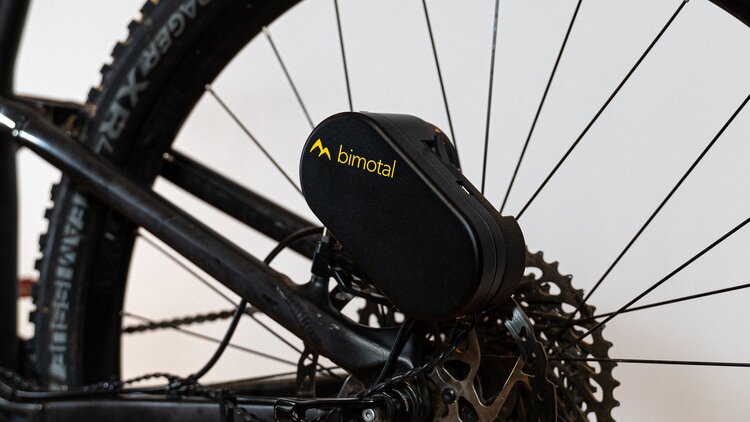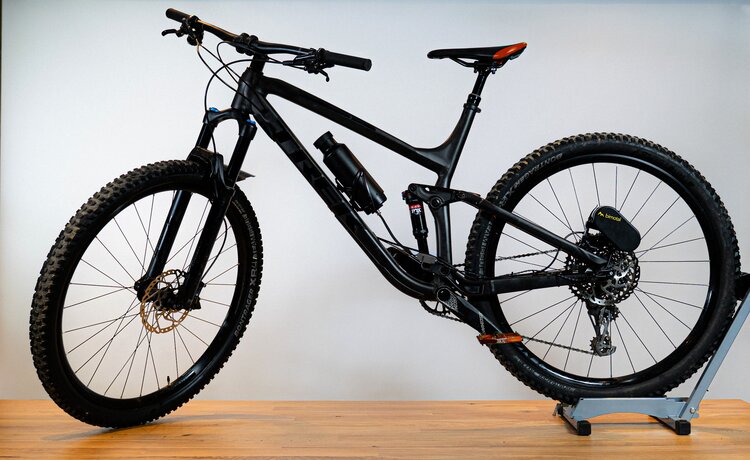The Bimotal company is cleaver on so many levels that it is tough to know where to start.
THE PRODUCT
Bimotal is in the process of introducing the Elevate, a powerful electric motor that attaches to the disc brake mount of select mountain bikes. It is an ingenious invention for motorizing a mountain bike if it works as claimed (the product is not yet available although they will take your deposit). Once the mounting hardware and gearing is installed (included in the $1950 price), your bike is ready to blast along the trail at speeds up to a claimed 28 miles per hour without pedaling. The company claims that the Elevate is easily attached or removed once your bike has been modified. Their promotional videos claim that “I can definitely see guys who are downhillers strapping it on their bikes, taking it up the hill and then kinda bombing down,” and “when I went up that hill, I didn’t lower a gear, I didn’t downshift, I just used the throttle.” This product blows my speed comparison study off the trail.
RIDING AROUND REGULATIONS
The Elevate slips through the cracks of E-bike regulations and legislation. While I’m not an attorney, the boiler-plate E-bike legislation states that the defined E-bike class structure is for “manufacturers and distributors of electric bicycles.” Bimotal is not selling an E-bike. Once their kit is installed, the result is a bike that would be a Class-3 E-bike (not permitted for operation on natural-surface, multi-user trails) but since they are not selling bikes, they are not, in my opinion, obligated to identify the bike’s class. Very sneaky, Bimotal! Even if you include a “Class 3” sticker with the kit, there is no provision in the law that requires the owner to affix it. Will you get booted off a trail on an Elevate-powered mountain bike? It is very unlikely short of plowing into someone while blazing along at top speed. That’s because there is no way for a ranger to visually identify the bike as a Class-3 E-bike. And that’s what Bimotal is betting on.
MISSING THE MARK
The company claims that they are motivated to “do everything we can to make the planet sustainable—beginning with our passion and expertise of personal electric vehicles. We hope to be one of many key companies making progress – for the benefit of all forms of life.” Sorry Bimotal, but how does motorizing a human-powered recreational vehicle do anything but add to planet sustainability issues? Bimotal isn’t talking about replacing automobile trips, easing traffic congestion or reducing emissions (although I suppose future products could address that). They are pitching old riders (like me) to blast up hills on mountain bikes without pedaling. Hey, I love that idea. Just don’t feed me the crap about benefiting all forms of life. I’d find this laughable if it wasn’t so dishonest (dishonesty is a trait that Bimotal actually promotes in their promotional video below).
THE ELEVATE BELONGS ON OHV TRAILS
Long-time visitors to Jimmy Mac On Two Wheels will not be surprised by my opinion that products like the Elevate have no place on natural-surface, multi-user recreational trails where it would be the fastest trail user by a long shot. High-speed, electric-motorized bicycles belong on trails shared and designated for motorized recreation.
About the author: Jim “Jimmy Mac” McIlvain was Editor of Mountain Bike Action Magazine and Road Bike Action Magazine and a contributing editor of Electric Bike Action Magazine. He has been used as a resource by land management agencies in developing e-bike and mountain bike policy. He welcomes feedback or questions from land management agencies, retailers and riders who deal with e-bike issues. The Jimmy Mac On Two Wheels website is self-funded.

